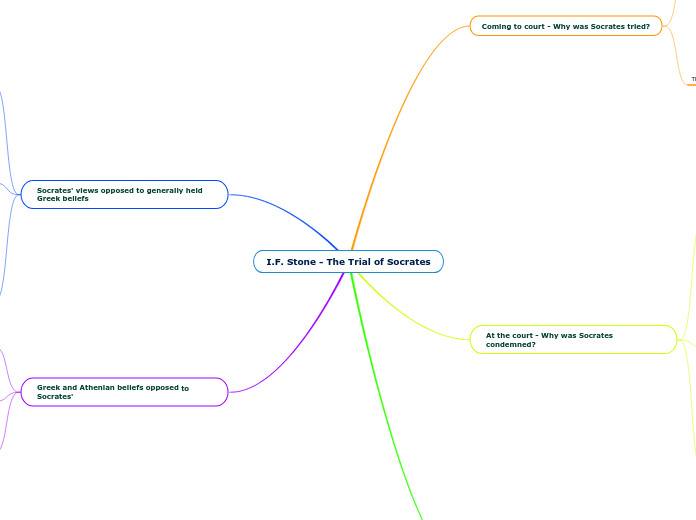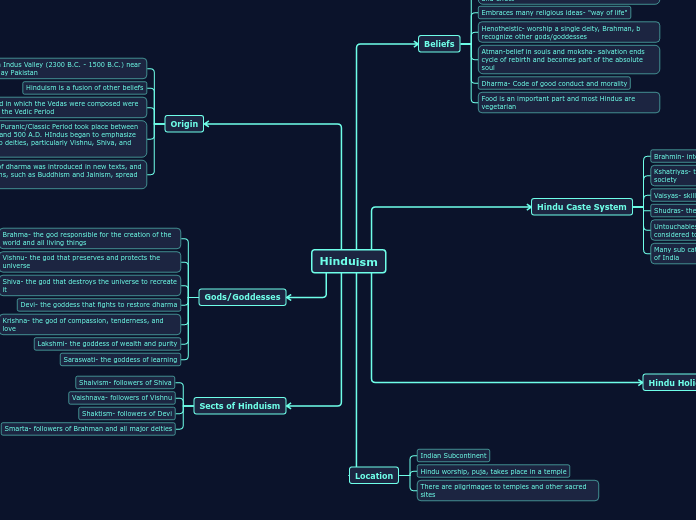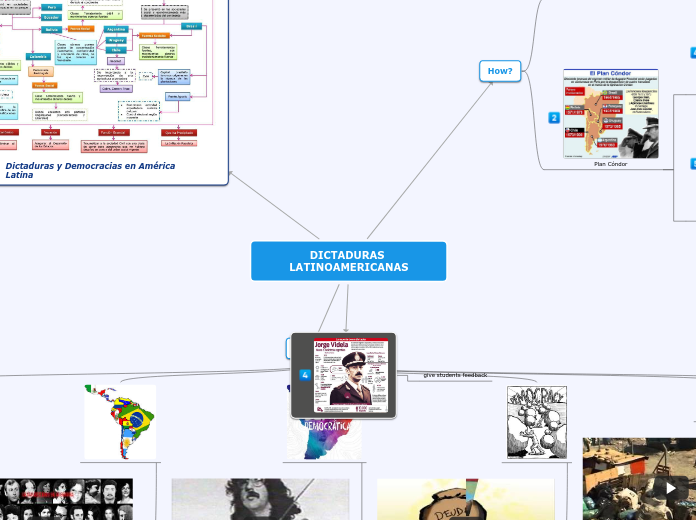I.F. Stone - The Trial of Socrates
Greek and Athenian beliefs opposed to Socrates'
Moral obligation of participating in the city business and common weal - ἰδιώτης
All humans have basic moral and political knowledge - otherwise, any community would be impossible.
Aristotle, Rhetoric: "Man has sufficient intelligence to be reached by reasoned argument"
Dialectical syllogism - from true premises to the necessarily and always true
Rhetorical syllogism - from true premises to the probable
Courts and Assemblies
Knowledge can be learnt by everybody - Sophists as teachers of the emerging middle class
Men as citizens (zoon politikon)
Citizens should rule. Only issue of dispute is if citizens should be few (oligarchy) or many (democracy).
Socrates' views opposed to generally held Greek beliefs
One shouldn't devote oneself to public service (politics), but to cultivation of self
The real philosophers avoid stepping in the public spaces of the democracy
Spartans as 'closet' philosophers
Idealized view of the Spartan and Cretan constitutions, models for a self-centered, totalitarian and xenophobic state
Danger and moral dereliction of duty? Why didn't Socrates advice against harsh policies (Melos, Mytilene) or against tyrannical rule?
Virtue = Knowledge, but Knowledge can't be taught
Rhetoric as mere flattery
"He who knows the truth can do no evil"
'True' knowledge is abstract, pure, perfect, and conceptually clear
Socrates' negative dialectic - striving for impossibly perfect definitions
Delphi Oracle - Socrates a the wisest of men
Socratic Irony: while reducing to ridicule the administrators and citizens of Athens, is he (and followers) really humble?
Paradox - disciples get to choose between plain skepticism (Anthistenes) or dualism (Plato)
Paradox: mixing knowledge and virtue is plainly contradictory
Socrates' wise, unruly and morally wicked disciples: Critias and Alcibiades
Paradox: people can be courageous (or any other virtue) without being able to define the concept precisely
At most, a human can be aware of his 'lack of knowledge', and only a few can aspire to learn even this.
Men as a herd animals that should obey their betters
"Only the learned should rule"
Idealized kings, with some inspiration from pre-classical texts (Homer, Lyrical poetry)
My thoughts on it
The author as journalist and late-time classicist
The Plague of the Present in analyzing the Past
Pericles as Thomas Jefferson
Idealization of Athenian Democracy?
Probably, a bit hash on Socrates
Very well written and very persuasive
At the court - Why was Socrates condemned?
The trial of Socrates as an issue of free speech
In spite of all his case for the prosecution, the writer finds the city of Athens wanting in this case where is freedom of speech is put to the test
While highlighting this might have saved Socrates, he clearly had no interest in doing so
Slim majority in condemning probably reflects the unease of the jury
Socrates' accusation was based on his beliefs, not on deeds
Socrates the Suicidal - boycotting his own case
Why did Socrates want to die?
Philosophically held strong beliefs
Martyrdom and self-fulfilling demonstration of the wickedness and inferiority of democratic rule
Immortality of the soul and pleasant Afterlife
soma-sema: body as a prison for the soul
Philosophy as a preparation for death
Red herrings? Old age, obeisance to the law
Defiance and arrogance towards the court
Socrates as the wisest of mortals
Prytaneion as punishment
Socrates' main accuser: Anytus, the democratic politician
Two Roman-period lies - Anytus was murdered and Athenian repentance at Socrates' death
Aeschines's speech
Named sitophylakes
Motivations - the general and the personal - Anytus' son
a moderate who renounced the possibility of recovering his confiscated wealth
a democratic general, active in overthrowing the 30
Coming to court - Why was Socrates tried?
The real deal - Socrates' and his disciples' Philolaconism
Plato's intense antidemocratic beliefs and ideals
Plato's silence about the 30, and positive representations of Charmides and Critias in the dialogues
The 'Critias' - an alternative view to democratic Athens
'Noble lies', eugenics, clean slates and caste system in the Republic
Xenophon's story about Socrates' half-hearted opposition to the 30, as opposed to his antidemocratic vehemence
Socrates as mentor and intellectual inspiration for the radical antidemocratic dictatorships: 411, 404, 401
Political reasons avoided in the Platonic texts
A red herring - religious impiety
The accusation of 'disbelieving in the gods of the city' actually hides a rejection of the democratic nomos, re-deified by the polis
Hephaistos and Athena, gods of the craftsmen
Peitho
Zeus Agoraios
Abundant rationalistic interpretations and criticism of gods in the theatre
General free speech in Athens









